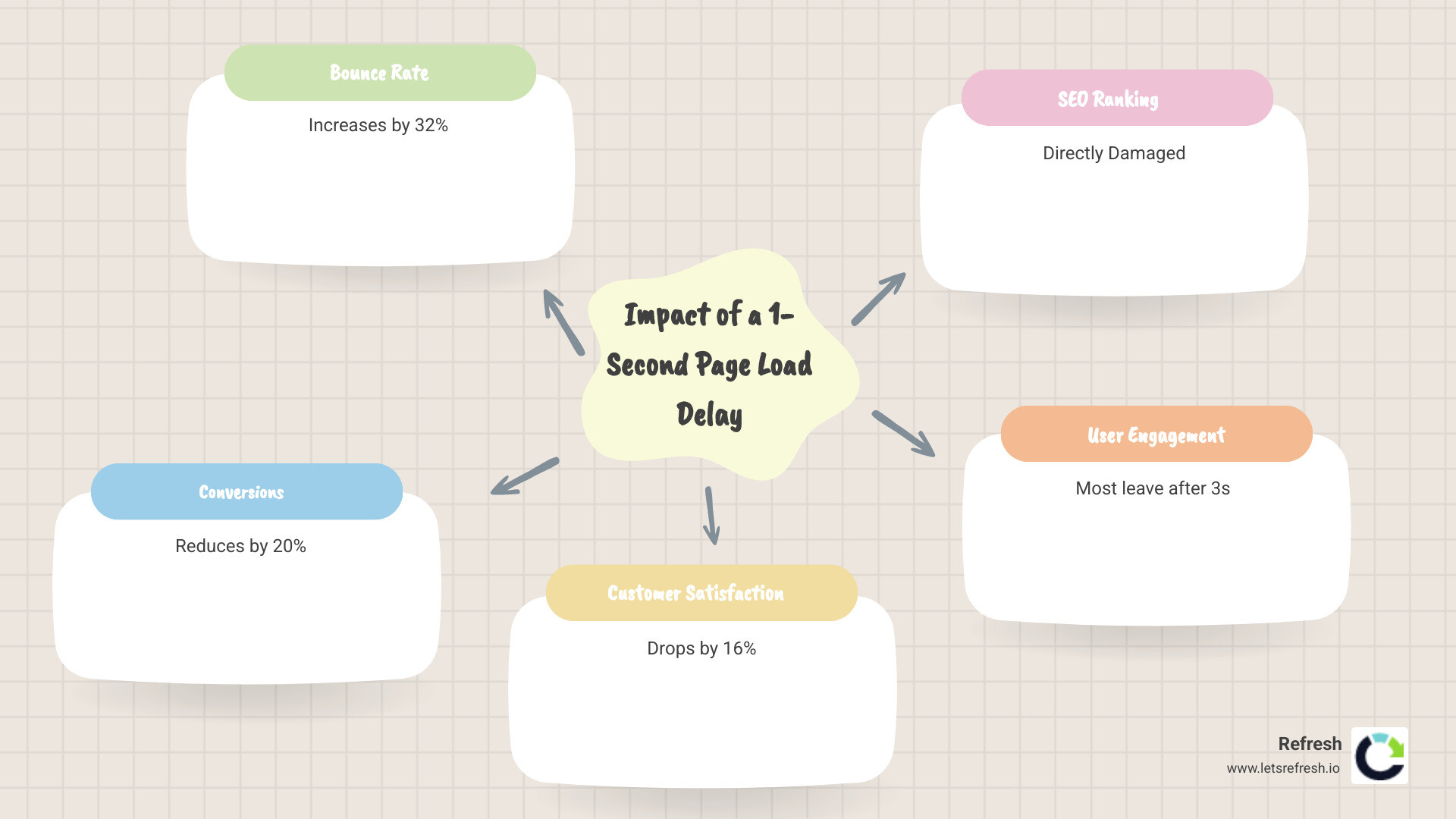Why Your Website's Speed Starts with Your Host
Fast website hosting is the foundation that determines whether your website loads in under a second or frustrates visitors with sluggish performance. Here's what you need to know:
Key Speed Features to Look For:
- TTFB under 200ms (anything over 400ms is slow)
- NVMe SSD storage (6x faster than regular SSDs)
- LiteSpeed web server (up to 12x faster than Apache)
- Built-in CDN for global content delivery
- 99.9%+ uptime guarantee
The numbers are brutal. A one-second delay in page load time hurts user satisfaction and conversions. Google also uses page speed as a key ranking factor, so slow hosting directly damages your search visibility.
Think about your own browsing habits. When a website takes more than 3 seconds to load, you probably hit the back button. Your potential customers do the same thing.
The difference between fast and slow hosting comes down to three core factors: server hardware (like NVMe SSDs), optimized software (like LiteSpeed), and strategic server locations with CDN integration.
I'm Alexander Palmiere. After developing 200+ websites at Refresh Digital Strategy, I've seen how fast website hosting is the difference between a site that converts and one that watches visitors bounce away. It's a critical choice for online success.

Why Speed Matters: The Impact of Fast Hosting on Your Business
Imagine walking into a store where the doors take forever to open. You'd leave, right? That's what happens when your website loads slowly.
Fast website hosting isn't just a technical detail; it's the foundation that determines whether visitors stick around or click the back button in frustration. A one-second delay can crush conversion rates and send your bounce rate soaring. In a world of instant gratification, waiting three seconds for a page to load feels like an eternity.
It gets more serious: Google uses page speed as a key ranking factor. Slow hosting doesn't just annoy visitors; it hurts your chances of being found online. For small and medium businesses, this can be the difference between thriving and struggling.

How Hosting Speed Affects SEO
When building an SEO Strategy for Small Business, ignoring hosting speed is like trying to win a race with a flat tire. Google cares deeply about how fast your content loads.
Google's Core Web Vitals are the gold standard for measuring performance. Two crucial metrics your hosting directly impacts are:
Largest Contentful Paint (LCP) measures how long it takes for your biggest piece of content to appear (aim for under 2.5 seconds). Time to First Byte (TTFB) shows how quickly your server responds (under 200ms is excellent; over 400ms is slow).
Slow hosting also affects your crawl budget—how many pages Google's bots can crawl on your site. If pages load slowly, Google may not crawl all your content, meaning some pages might not appear in search results.
With mobile-first indexing, Google primarily uses your mobile site's performance for ranking, making fast hosting non-negotiable. Understanding Why is SEO Important in a Digital Marketing Strategy means recognizing that technical performance and marketing success are deeply connected.
The User Experience and Your Bottom Line
Your website's speed creates the first impression. Visitors expect your site to appear instantly. A slow-loading site signals that something might be wrong with your business.
This hits e-commerce sites particularly hard. A customer ready to buy won't wait for a slow checkout page; they'll abandon their cart and shop elsewhere.
Customer trust builds with a fast, responsive website. It tells visitors you're professional and reliable. A sluggish site can make even the best businesses look outdated.
The impact on your bottom line is direct. Fast sites see better engagement rates, higher conversion rates, and improved lead generation. Your website's performance reflects your brand perception, which can make or break your success.
At Refresh, when we help businesses with Maximizing Website Performance: Tips and Best Practices, we see performance improvements translate directly into business growth. Speed isn't just a technical metric—it's a powerful driver of revenue.
The Engine Room: Key Factors of Fast Website Hosting
What separates fast hosting from the competition? It's the technology behind the scenes. Like a sports car, every component must work in harmony. Fast website hosting operates on this principle, relying on cutting-edge hardware, strategic server placement, and optimized software to deliver sub-second load times.

Server Hardware and Technology
The heart of any fast website hosting solution is powerful hardware. The difference between fast and slow hosting often comes down to what's powering your website.
NVMe SSDs are the speed demons of storage, operating 6 times faster than regular SSDs. They serve your website's files and database information at blazing speeds.
AMD EPYC processors are the muscle, delivering up to 40% faster page loads than older CPUs. They handle multiple visitor requests simultaneously without breaking a sweat.
Adequate RAM allocation and multiple CPU cores ensure your site has dedicated resources for dynamic content or traffic spikes. A quality Managed Web Hosting Service optimizes these components to work together seamlessly.
Server Location and CDNs
Geography matters. When your server is thousands of miles from your visitors, data has to travel that entire distance, causing delays.
Data center proximity to your target audience directly impacts latency. Smart hosts offer multiple data center locations so you can choose the best geographic fit.
This is where Content Delivery Networks (CDNs) become your secret weapon. A CDN creates a global network of servers that cache your website content. When someone visits your site, they are served from the closest possible location.
The benefits are impressive: reduced load times for assets like images, improved global reach, and reduced load on your main server. Many top hosts now include CDN integration as standard.
Optimized Software Stack
Great hardware is only half the battle. The software running on the servers determines efficiency. Optimized software is needed to open up the hardware's full potential.
LiteSpeed Web Server is the gold standard for speed, performing up to 12 times faster than traditional servers for WordPress sites. This translates directly to faster load times.
NGINX is another high-performance option, excellent at handling heavy traffic and serving static content quickly.
The latest PHP versions bring significant speed and security improvements. Using outdated PHP is like running modern software on an old computer—it works, but slowly.
Database optimization ensures quick information retrieval, while Gzip and Brotli compression shrink file sizes by 70% or more for faster downloads.
These components create an optimized environment where fast website hosting can truly shine. The best providers fine-tune this stack for consistent, reliable speed.
Choosing Your Speed Tier: Hosting Types Explained
Picking the right hosting is like choosing the right vehicle. Your choice affects your site's fast website hosting performance, cost, and ability to handle growth. When exploring Website Hosting for Small Business options, understanding these three main types will help you make the right call.
| Hosting Type | Speed/Performance | Scalability | Cost (Approx. Monthly) | Technical Skill Required |
|---|---|---|---|---|
| Shared Hosting | Basic, can be affected by "noisy neighbors" | Limited, upgrade required to scale | $2 - $15 | Low |
| VPS Hosting | Good, dedicated resources within a shared server | Moderate, can upgrade resources within the VPS | $10 - $50+ | Medium |
| Cloud Hosting | Excellent, highly distributed and optimized | High, on-demand resource allocation | Variable ($20 - $1000+) | High (often managed) |
Shared Hosting: The Entry-Level Option
Shared hosting is like an apartment building where everyone shares utilities. Your website lives on a server with hundreds of others, sharing resources like CPU, memory, and storage. This makes it incredibly affordable and perfect for beginners or low-traffic sites.
The main drawback is the "noisy neighbors" effect: a traffic spike on another site can slow yours down. Shared hosting is great for starting out, but you'll likely need to upgrade as your business grows.
VPS Hosting: A Step Up in Performance
Virtual Private Server (VPS) hosting is like upgrading to a townhouse. You still share a physical server, but you have your own dedicated space with guaranteed resources. This gives you better control and improved speed.
VPS hosting offers great scalability, allowing you to upgrade resources as your business grows without moving servers. It's ideal for growing businesses that have outgrown shared hosting but aren't ready for the complexity of cloud solutions. It hits the sweet spot of performance and affordability for online stores or sites with steady traffic growth.
Cloud Hosting: The Ultimate in Speed and Reliability
Cloud hosting is like a luxury penthouse. Your website lives across a network of interconnected servers, not just one. This provides high availability and redundancy, meaning your site stays online even if a server has issues.
Cloud hosting's greatest strength is scalability. You can scale resources up or down based on demand in real-time, perfect for handling traffic surges from marketing campaigns. Many providers use a pay-as-you-go model, which can be cost-effective for fluctuating traffic.
It delivers excellent performance for high-traffic websites and e-commerce stores where minimal downtime is critical. While it may require more technical knowledge (or managed services), the reliability benefits make it the top choice for serious online businesses.
The Ultimate Checklist: Features of a High-Speed Host
Choosing fast website hosting is about more than speed. Like buying a car, you also need reliability, good customer service, and affordability. The fastest server is useless if it crashes or you can't get help when something goes wrong. That's why we recommend looking for the Best Website Hosting for Support alongside speed.
Essential Features for Fast Web Hosting
These features are non-negotiable for fast website hosting that keeps your business running smoothly.
Uptime guarantees of 99.9% or higher are critical. This means your site is down for less than 9 hours per year. Anything less is unacceptable for a serious business.
Round-the-clock expert support is a lifesaver. The best hosts offer 24/7 support via live chat, phone, and tickets with quick response times.
Free SSL certificates should be standard. They encrypt your site's connection, protect visitor data, and provide a small SEO boost.
Automated daily backups are your safety net. If your site gets hacked or an update goes wrong, you can restore it quickly. Daily is better than weekly for peace of mind.
Comprehensive security features like malware scanning, web application firewalls, and DDoS protection keep your site safe. The best hosts include these as standard.
Finding Affordable Fast Web Hosting
Good news: fast website hosting doesn't have to be expensive. You can get excellent speed and reliability without breaking your budget if you're smart about it.
Watch out for introductory pricing tricks. Many hosts offer low first-year prices but have much higher renewal rates. Always check the renewal cost.
Pay attention to resource limits. "Unlimited" plans usually have a "fair usage" policy. Understand the limits on NVMe SSD storage, bandwidth, CPU, and RAM to ensure your plan has room for growth.
The sweet spot is finding genuine value for money. Balance cost with the essential speed and reliability features your business needs. Going too cheap often means compromising on performance. As we tell our clients at Refresh, paying a bit more upfront can save you from headaches and lost opportunities. For more guidance, check out our guide on Cheap Web Hosting for Small Business.
Frequently Asked Questions about Fast Web Hosting
When it comes to fast website hosting, business owners often have questions. Here are the most common ones we hear.
How can I test my website's hosting speed?
Testing your website's speed is easy and essential. Use free tools like Google PageSpeed Insights, GTmetrix, or Pingdom. They provide real insights into your website's health.
The key metrics to watch are Time to First Byte (TTFB), which measures server response time, and Largest Contentful Paint (LCP), which shows when the main content becomes visible. These tools help diagnose if the problem is your host, code, or content.
What are the most common reasons for a slow website?
From our experience, the same speed killers appear repeatedly. Unoptimized images are the biggest culprit—photos that are too large or poorly compressed.
Other major issues include bloated code (excessive CSS/JavaScript), too many plugins, heavy themes, and outdated software. However, a slow hosting server is often the foundational problem that makes everything else worse. Not using a Content Delivery Network (CDN) also significantly slows down your site for a global audience.
What is a good Time to First Byte (TTFB)?
TTFB measures how quickly your server responds. A good TTFB is under 200 milliseconds. Anything between 200ms and 400ms is acceptable, but over 400ms is a red flag that your hosting is the bottleneck.
Top-tier platforms can achieve around a 90ms TTFB. This metric is the starting gun for your website's loading race. When shopping for fast website hosting, always check the TTFB performance. A fast-responding server gives your site the best chance to load instantly.
Conclusion
Your website's speed is about your business's future. Fast website hosting determines whether visitors become customers or click away to competitors.
We've covered the essential building blocks of speed: NVMe SSDs and AMD EPYC processors for hardware, plus LiteSpeed web servers and CDN integration for software. These aren't just buzzwords—they're the difference between a site that converts and one that frustrates.
Choosing between shared, VPS, and cloud hosting is about matching your business needs to the right performance tier. A growing e-commerce store has different needs than a local restaurant's site.
Speed alone isn't enough. The best hosting combines performance with 99.9% uptime guarantees, 24/7 expert support, and robust security. Affordable fast website hosting exists, but look beyond introductory prices to renewal rates and resource limits.
At Refresh, we've seen the right hosting choice transform businesses. Your website is your digital storefront; it deserves hosting that works as hard as you do. Choosing Website Hosting for Small Business that prioritizes speed is essential for success.
Don't let slow hosting hold your business back. Your customers are waiting.





.avif)


